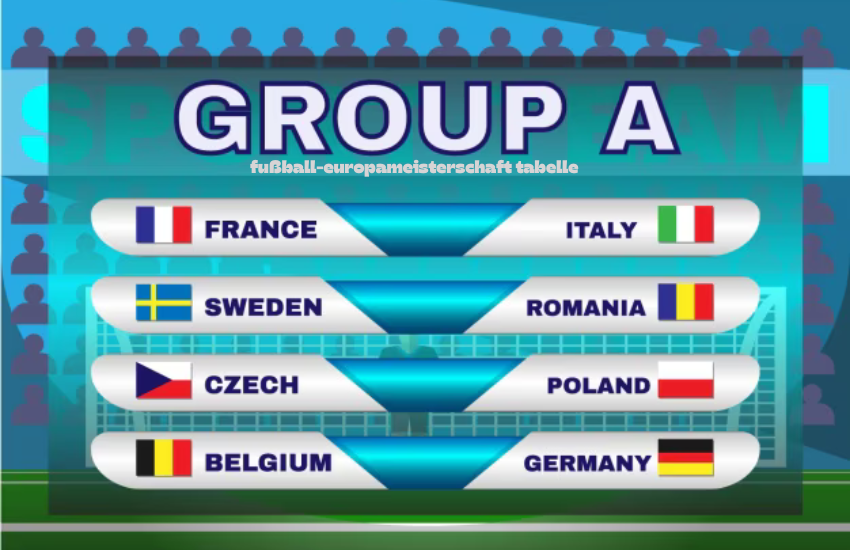Fußball-europameisterschaft tabelle, often referred to simply as the “Euros,” is one of the most prestigious football tournaments in the world. Every four years, national teams from across Europe compete for the coveted title. As the competition unfolds, fans, analysts, and teams alike keep a close eye on the Tabelle—the standings table that tracks each team’s performance throughout the tournament. In this comprehensive guide, we will explore every aspect of the Tabelle, from its structure and criteria to its historical significance and predictive power.
Introduction to the UEFA European Championship
The fußball-europameisterschaft tabelle, commonly known as the Euros, is a football tournament that has been captivating audiences since its inception in 1960. As Europe’s premier international competition, it showcases the best talents from across the continent and has become a symbol of footballing excellence.
Overview of the UEFA European Championship
The UEFA European Championship is organized by the Union of European Football Associations (UEFA) and is held every four years. The tournament features the top national teams from Europe, competing in a series of matches to determine the champion. Over the years, the Euros have grown in stature, rivaling the FIFA World Cup in terms of prestige and competitiveness.
History and Evolution of the Tournament
The Euros began as a modest 4-team competition in 1960 but has since expanded to include 24 teams, reflecting the growth and development of European football. The tournament has seen many changes in its format, with the introduction of group stages, knockout rounds, and more teams to accommodate Europe’s footballing giants and emerging nations alike.
Importance of the Tournament in European Football
The European Championship is more than just a football tournament; it is a cultural event that unites nations, celebrates footballing heritage, and showcases emerging talents. For players and fans, winning the Euros is a pinnacle of achievement, bringing not only glory but also a sense of national pride.
Structure of the UEFA European Championship
The tournament’s structure is carefully designed to ensure a fair and competitive environment, allowing the best teams to progress while maintaining the excitement for fans.
Qualification Process
Teams must go through a rigorous qualification process to earn a spot in the tournament. This involves competing in qualifying groups, with the top teams securing direct entry, while others might face playoff rounds.
Group Stage Format
Once in the tournament, teams are divided into groups where they play round-robin matches. The performance in these groups is critical, as it determines their progression to the knockout stages.
Knockout Stage Overview
The knockout stages are where the intensity heightens. Here, teams face off in single-elimination matches, leading up to the final where the champion is crowned. The knockout stage is often where the tournament’s most memorable moments occur.
Understanding the Tabelle (Standings Table)
The Tabelle, or standings table, is a crucial element of the UEFA European Championship, providing a snapshot of each team’s performance during the tournament.
Definition of “Tabelle” in Football Context
In football, the Tabelle refers to the standings table, which lists teams based on their performance in matches. It shows points accumulated, goals scored, goals conceded, and other relevant statistics.
Importance of the Tabelle in the Tournament
The Tabelle is essential for tracking the progress of teams throughout the group stages. It determines which teams advance to the knockout rounds and can be a source of tension as teams fight for position.
How the Tabelle is Organized
The Tabelle is organized by points, with teams earning three points for a win, one point for a draw, and none for a loss. It also includes metrics like goal difference (GD), goals scored, and head-to-head records to break ties.
Criteria for Ranking Teams in the Tabelle
Ranking teams in the Tabelle involves several criteria that ensure a fair assessment of each team’s performance.
Points System Explanation
The primary criterion for ranking teams is the points system. Teams accumulate points based on match results—three for a win, one for a draw, and zero for a loss.
Goal Difference (GD) and Its Impact
Goal difference, calculated by subtracting goals conceded from goals scored, is used as a tiebreaker when teams have equal points. A higher goal difference indicates a stronger overall performance.
Head-to-Head Records
When teams have the same points and goal difference, their head-to-head results are considered. This includes the outcome of their direct matches in the tournament.
Fair Play Points and Other Tiebreakers
In some cases, fair play points, which penalize teams for disciplinary issues, and other tiebreakers such as total goals scored or UEFA rankings, are used to determine standings.
Historical Performance in the Tabelle
The Tabelle has been a reflection of the shifting dynamics of European football over the decades.
Teams with Most Top Table Finishes
Historically, teams like Germany, Spain, and Italy have frequently finished at the top of the Tabelle, showcasing their consistent strength in the tournament.
Notable Surprises in the Tabelle
Over the years, there have been several surprises, such as smaller nations performing unexpectedly well, upsetting traditional powerhouses in the Tabelle.
Trends in the Tabelle Over the Years
The Tabelle has evolved, with trends indicating shifts in footballing power across Europe, influenced by changes in coaching, player development, and tactical approaches.
Key Teams and Their Tabelle Performances
Certain teams have dominated the Tabelle over the years, reflecting their strength in European football.
Germany’s Dominance in the Tabelle
Germany has a storied history in the European Championship, often finishing at or near the top of the Tabelle, thanks to their tactical discipline and strong squad depth.
Spain’s Consistent Performances
Spain’s dominance, particularly during their golden era in the late 2000s, saw them consistently finish high in the Tabelle, reflecting their possession-based style of play.
France and Italy: Powerhouses in the Tabelle
France and Italy have also been regular top performers in the Tabelle, with both nations boasting multiple tournament wins and strong footballing traditions.
Analysis of Recent UEFA European Championship Tabellen
A look at recent tournaments offers insights into current trends and emerging powerhouses.
Overview of the Most Recent Tournament’s Tabelle
The most recent European Championship Tabelle highlighted the resurgence of traditional powers and the emergence of new contenders, providing a snapshot of the current state of European football.
Top Performers and Surprises
Recent tournaments have seen a mix of expected top performers and surprising underdogs, illustrating the unpredictable nature of the Euros.
Comparing Recent Tabellen with Historical Data
Comparing recent Tabellen with historical data can reveal shifts in dominance, the impact of tactical innovations, and the rise of new footballing nations.
Impact of Group Draws on the Tabelle
The group stage draw plays a crucial role in shaping the Tabelle.
How Group Draws Influence the Tabelle
The draw determines which teams face each other in the group stage, significantly influencing the final Tabelle. A favorable draw can lead to an easier path, while a tough draw can complicate even the strongest teams’ progression.
“Group of Death” and Its Effects
The so-called “Group of Death,” featuring multiple strong teams, can dramatically affect the Tabelle, often resulting in one or more top teams being eliminated early.
Strategies Teams Use to Navigate Tough Groups
Teams often adjust their strategies depending on their group opponents, with some prioritizing defensive solidity to secure crucial points, while others may adopt a more attacking approach.
Role of Home Advantage in the Tabelle
Home advantage can have a significant impact on a team’s Tabelle performance.
Home Countries and Their Tabelle Performances
Host nations often perform better in the Tabelle due to the support of the home crowd, familiarity with venues, and reduced travel fatigue.
Case Studies: How Host Nations Fared in the Tabelle
Past tournaments have shown that host nations frequently excel in the Tabelle, with some going on to win the championship, leveraging their home advantage effectively.
Psychological Impact of Home Crowds
The psychological boost provided by home fans can spur teams to perform beyond expectations, while the pressure can also sometimes be overwhelming.

Statistical Analysis of the Tabelle
A deep dive into the statistics behind the Tabelle offers valuable insights.
Most Common Final Standings (1st, 2nd, 3rd)
Analyzing the most common final standings can help identify patterns and predict potential outcomes in future tournaments.
Correlation Between Tabelle Position and Tournament Success
There is often a strong correlation between a team’s Tabelle position and their overall success in the tournament, though there are exceptions.
Predictive Models Based on Historical Tabellen
Using historical Tabellen data, analysts can create predictive models to forecast future tournament outcomes, helping fans and teams alike understand potential scenarios.
Influence of Player Performances on the Tabelle
Individual player performances can greatly influence a team’s position in the Tabelle.
Key Players and Their Impact on the Tabelle
Star players who perform well in crucial moments often have a significant impact on their team’s Tabelle standing, driving them to higher positions.
Golden Boot Winners and Team Standings
There is often a correlation between the Golden Boot winner (top scorer) and the team’s Tabelle position, as prolific scorers can lead teams to better results.
Defensive Strength and Its Contribution to the Tabelle
While attacking prowess is important, a strong defense is equally crucial in securing a top position in the Tabelle, often making the difference in tight matches.
Managerial Tactics and Their Effect on the Tabelle
The tactical approaches of managers play a pivotal role in shaping the Tabelle.
Tactical Approaches That Lead to Top Table Finishes
Different tactical approaches, from possession-based football to counter-attacking strategies, can lead to success in the Tabelle, depending on the team’s strengths.
Famous Managers and Their Tabelle Success Stories
Managers like Vicente del Bosque, Joachim Löw, and Didier Deschamps have achieved significant Tabelle success through their tactical acumen and ability to adapt to tournament demands.
The Role of In-Game Adjustments
In-game tactical adjustments, such as substitutions and formation changes, can be decisive in securing points that improve a team’s Tabelle standing.
Media Coverage and Public Perception of the Tabelle
The Tabelle is not just a tool for teams but also a focal point for media and public discourse.
How the Media Reports on the Tabelle
The media plays a crucial role in shaping public perception of the Tabelle, with coverage focusing on top teams, surprises, and potential upsets.
Public Reactions to Tabelle Changes
Changes in the Tabelle can lead to significant public reaction, with fans and pundits alike analyzing what these shifts mean for the tournament’s progression.
The Influence of Social Media on Team Morale and Performance
Social media has amplified the impact of the Tabelle on team morale, with real-time reactions from fans influencing player and team dynamics.
Tabelle as a Predictor for Future Success
The Tabelle often provides clues about which teams might succeed in the later stages of the tournament.
Can Tabelle Success Predict Tournament Outcomes?
A strong performance in the Tabelle is often a good predictor of success in the knockout rounds, although there have been notable exceptions.
Historical Analysis of Tabelle Leaders and Tournament Winners
Analyzing the correlation between Tabelle leaders and tournament winners over the years can provide insights into what it takes to convert group stage success into overall victory.
The Role of Momentum from Group Stages to Knockout Rounds
Momentum gained from a strong Tabelle performance can carry a team through the knockout stages, while teams that struggle early on often find it difficult to recover.
Conclusion and Future Outlook
The Tabelle is a vital component of the UEFA European Championship, providing a clear picture of team performances and setting the stage for the drama of the knockout rounds. As we look to future tournaments, the Tabelle will continue to be a key element in predicting success and understanding the dynamics of European football.
Summary of Key Points
The Tabelle is essential for understanding team performance in the UEFA European Championship, with its structure and criteria offering a fair and comprehensive assessment.
Future Trends in the UEFA European Championship Tabelle
As European football continues to evolve, future Tabellen may reflect new trends, such as the rise of emerging footballing nations and the impact of modern tactical innovations.
Predictions for the Next Tournament
Looking ahead to the next UEFA European Championship, the Tabelle will again be a focal point for fans and analysts alike, with predictions already being made about which teams will rise to the top.
FAQs:
- What is the UEFA European Championship Tabelle?
- The Tabelle is the standings table that ranks teams based on their performance in the UEFA European Championship group stages.
- How are teams ranked in the UEFA European Championship Tabelle?
- Teams are ranked based on points earned, goal difference, goals scored, and head-to-head records.
- Why is the Tabelle important in the tournament?
- The Tabelle determines which teams advance to the knockout stages and influences the matchups in those rounds.
- Which teams have historically performed well in the Tabelle?
- Teams like Germany, Spain, and Italy have historically performed well, often finishing at the top of the Tabelle.
- Can the Tabelle predict the tournament winner?
- While a strong Tabelle position often correlates with success, it does not guarantee a tournament win.
- How does the group draw affect the Tabelle?
- The group draw can significantly impact the Tabelle, with tougher groups making it harder for even strong teams to secure top positions.




